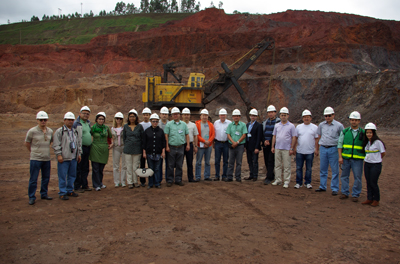Developing the Mining Sector in Tajikistan

Summary
With one of the largest silver deposits in the world as well as other important minerals, Tajikistan is trying to make full use of its mineral sector to encourage economic growth. However, Tajikistan’s geological information is outdated, the mining sector is only now starting to attract significant foreign investment, and the many government agencies involved in the sector are unorganized and so not prepared to advance it as a sustainable economic driver. To expose Tajikistani officials to international best practices in mining sector reform and help them formulate a national mineral strategy, the World Bank organized a knowledge exchange with Brazil, whose mining sector has grown significantly in the past decade.
“[The] exposure to Brazil, a country that has strong experience in mining reforms and management of large-scale and small-scale mining, and has managed to make mining a source of economic growth over the last ten years, was invaluable,” said Alexandra Pugachevsky, Senior Country Officer at the World Bank.
Tajikistan policymakers applied what they learned about sector management to formulating the national mining strategy. Since the officials responsible for the strategy are also involved in the Bolshoi Konimansur tender, they immediately applied the lessons to that project as well, which may result in more than two billion dollars in investment in Tajikistan. Because mining sector policymakers from other parts of the Central Asia region (Kazakhstan and the Kyrgyz Republic) participated in the visit to Brazil, the exchange also strengthened the regional networks of mining professionals.
In their report to the Work Bank, Tajikistani participants noted that the visit helped them understand the vital roles different Brazilian institutions played in the mining sector: the Ministry of Mining supervises the sector; the Geological Survey of Brazil creates an up-to-date database to attract domestic and foreign investment; and the private sector operates the mines. Participants saw that these roles could be implemented in Tajikistan.
“The results of a trip in my opinion were quite important,” said Shukhratjon Rakhmatboev, Deputy Chairman of the State Committee on Investment and State Property Management of Tajikistan. “[Following the exchange, we] launched the reform of the mining sector of our country, prepared a draft program to improve the investment climate in the mineral resources . . . and prepared a new draft law, ‘On Subsoil and Subsoil Use in the Republic of Tajikistan’.”
Beneficiaries / Participants
If well managed, mineral resources can play an important role in a country's economic growth and development. Tajikistan has one of the world's largest silver deposits, while its potential for extracting and processing other minerals, such as gold, zinc, lead, and precious stones, is also strong. Despite Tajikistan’s mineral wealth, however, the sector has not been able to attract significant foreign investment. In addition, most of the country’s geological information is from the 1970s and 1980s and needs to be updated. The multiple governmental actors involved in mineral-sector management lack exposure to international best practices and are unable to make mining drive economic growth. The World Bank identified Tajikistan’s main knowledge gaps to be in the areas of legal and regulatory issues in large-scale mining management, socio-environmental management practices, and institutional best practices.
Brazil, on the other hand, has managed to turn its mining sector around in the past decade. The country has used its geological potential to stimulate investment, advancing economic growth and development. Brazil has also managed to develop the supply side of the minerals industry, generating local employment well beyond the mines themselves. With funding provided by the South-South Facility, the World Bank facilitated a knowledge exchange for nine Tajikistani mining sector practitioners, who went to Brazil to observe international best practices in mining sector reform. The experience helped them support the formulation of the national mineral strategy for Tajikistan.
Moving forward
Following the exchange, at the request of the Government of Tajikistan the World Bank included a mining component in an FY12 private sector development operation. These activities will involve the same policymakers who traveled to Brazil and thereby will build on the results of the knowledge exchange. In addition, Tajikistan is moving towards becoming a candidate country to the Extractive Industries Transparency Initiative (EITI), having signed all documents for adherence on April 5, 2012.
“The foundation for this work was laid by the World Bank . . . during the study tour to Brazil,” Mr. Avgonov said.
Further visits, including a possible visit from Brazilian hosts to the Central Asian region, are in the works. The World Bank has improved the level of trust and appreciation of its mining sector policy guidance after the visit. It gained a deepened engagement in the minerals sector, including the development of the private sector development project and likely EITI engagement.

 China
China Colombia
Colombia Denmark
Denmark India
India Indonesia
Indonesia Mexico
Mexico Russian Federation
Russian Federation Spain
Spain United Kingdom
United Kingdom